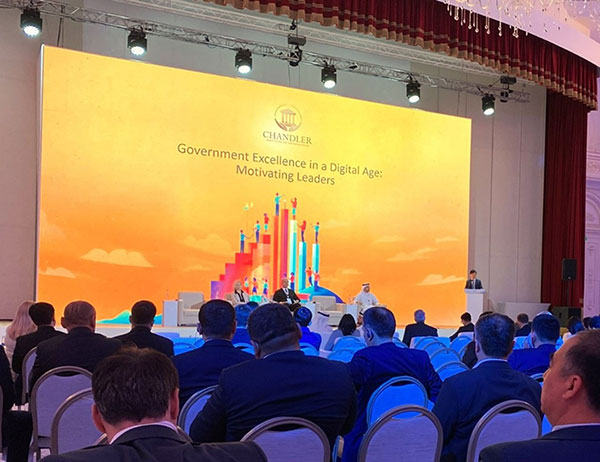First published in
GovInsiderMotivation, leadership and the future of public service
Civil service reform must focus on people, by strengthening their capabilities, developing leadership pipelines, and creating cultures in which they can thrive.
A high-performing government depends on a civil service that is both capable and motivated.
But for too long, careers in public service have been viewed as a form of personal sacrifice, characterised by low salaries, limited opportunities for career progression, and the assumption that civic duty should be enough motivation.
This outdated perception has made it harder for governments to attract and retain top talent.
That challenge, and the question of how to address it, was a focus of discussions at the 2025 UN Public Service Forum in Samarkand, where senior policymakers, public sector leaders, and practitioners gathered from around the world.
The discussions at Samarkand made it clear that, although robust systems and institutions are essential for building public sector capabilities, their success ultimately depends on the people who work within them.
Civil service reform must, therefore, focus on people – on strengthening their capabilities, developing leadership pipelines, and creating cultures in which public servants can thrive.
Prioritising these conditions could help governments better meet the increasingly complex demands of modern governance.
This matters deeply, as the quality of a nation’s governance depends on the capacity, motivation, and integrity of its public servants.
Rethinking public sector motivation
While public service values remain essential, efforts to strengthen the civil service must start by revisiting the assumption that a sense of civic duty alone is enough to sustain strong performance.
Of course, public service values remain essential, and people should not enter the civil service purely for financial gain. But governments can no longer rely only on public-spiritedness to attract and retain talented staff.
Encouraging young people to embark on long-term careers in the public sector requires the provision of structured job progression, training opportunities, and pay structures that reward strong performance.
Performance-linked pay is one such structure.
When used effectively, it encourages high standards by recognising those who deliver results, rather than rewarding employees simply for how long they have been in the role.
The Singapore public service has long used performance-linked pay structures, but in many other countries, public service salaries are still based on a fixed pay scale. Many participants at the conference highlighted efforts in their own countries to design, or begin thinking about, performance-based pay systems.
While such reforms are not yet widespread, there is growing interest and support among civil servants and policymakers engaged in the conversation.
The growing willingness to explore performance-linked pay is, in that sense, a positive development.
The challenges facing public servants today, from digital disruption to climate change, require a workforce that is properly motivated.
Why leadership matters
The value of effective leadership has been overlooked in the public sector for many years. Greater emphasis was instead placed on the need for hierarchical structures, better processes, and stronger legal frameworks.
The common belief was that if these systems were well designed, the individuals in leadership positions would matter less. But this view has started to change, because even the most carefully designed systems rely on the judgement and commitment of the people managing them.
That reality is now more widely recognised.
One delegate during a panel discussion at this year’s Forum argued that one of the biggest challenges for leaders was how to promote a culture of innovation while maintaining the structures that support consistency and stability.

Innovation is critical in a public sector context, but inherently involves risk-taking, and this must be balanced against the need for reliable systems and predictable outcomes. Leaders must therefore navigate this tension carefully. This balance was well understood by the participants in the discussion.
Governments are not startups, and not every civil servant will be a dynamic agent of change. Innovation must happen within structures and systems, and good leadership means designing and maintaining systems where experimentation is possible, but principled, supported, and aligned with broader organisational goals.
Values-based leadership
Traditionally, leadership in the public sector has been viewed as the domain of senior officials. There is now growing agreement that leadership development should start much earlier.
Governments must develop strong leadership pipelines to identify, support, and grow high-potential individuals from early in their careers, whether they are first-time managers, high-potential junior officers, or even those considering entering public service.
As one delegate put it, leadership development should be embedded in the daily work of public sector organisations and continuously supported over time.
This kind of sustained effort requires a culture where developing leaders is seen as an ongoing effort, rather than a one-off initiative.
Building a strong culture of leadership also means breaking down the structural barriers that limit access to leadership in the first place.
In France, efforts to streamline administrative structures and open up civil service careers to a wider range of candidates have included the evolution of elite public sector training institutions such as the École nationale d’administration (ENA) into the more inclusive Institut national du service public (INSP).
Turning theory into practice
The challenge for public sector institutions is to turn these principles into practice.
That requires leaders who understand the realities of their context, invest in building capabilities across people and systems, and actively shape a culture of integrity, service, and high performance.
It means moving beyond design and strategy to focus on what it takes to make reforms work on the ground, through people, behaviours, and day-to-day decisions.
This is how high-performing governments sustain progress: not through isolated efforts, but through collective leadership that brings these elements together into practice.

Wei Neng is CEO of the Chandler Institute of Governance, and Chairman of the Chandler Academy of Governance. He has served in various portfolios in the Singapore public service including Trade and Industry, Defence, and Public Sector Training, amongst others. He currently holds adjunct appointments with the Centre for Liveable Cities at the Singapore Ministry of National Development, the Singapore Civil Service College under the Prime Minister’s Office, and the Singapore University of Social Sciences.
Audrey is Deputy Director (Strategy and Communications) at the Chandler Institute of Governance (CIG). She supports CIG’s senior management in strategy development and external communications. Prior to joining CIG, Audrey served in the Singapore Ministry of Education (MOE) across various portfolios, including policy formulation, implementation, stakeholder engagement, and instructional programme design and delivery.









